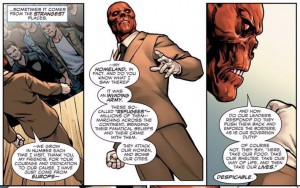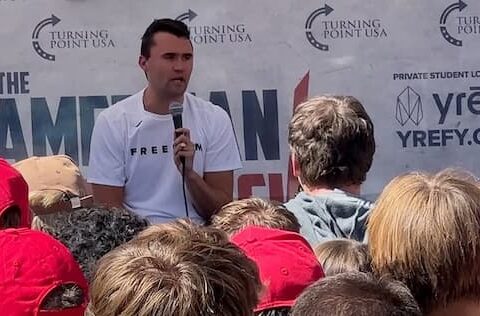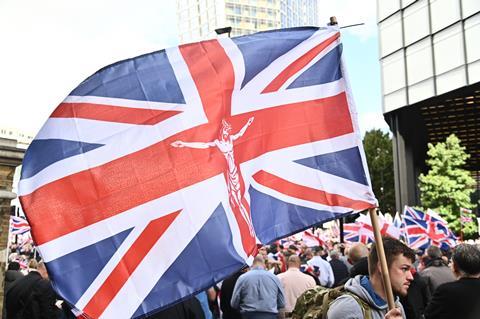So last week, as Marvel launched a new Captain America series, the first issue caught most people off-guard with its ending and even apparently offended a number of fans.
It also caused on online uproar and made headlines across most major American media outlets, along with accusations of ‘anti-Semitism’ and the writer even receiving death threats. ‘Outrage’ has never been so easy and so viral. All that’s missing are the pitchforks, torches and angry mobs.
Written by Nick Spencer, Captain America: Steve Rogers #1 seemingly gave us one of the most surprising revelations in Marvel Comics’ recent history; Steve Rogers, the epitome of all that’s good and wholesome in the Marvel Universe, is an agent of Hydra.
Or at least we’re given that impression.
Yep, Hydra – the evil organisation that, as far as most people are concerned (and as far as Marvel canon has mostly been concerned for the longest time) has its roots in Nazi Germany and the Red Skull.
So how, we ask, could that noblest American symbol and quintessential hero, whose – arguably – most famous image is punching Adolf Hitler in the face, possibly be an agent of Hydra?
The story in #1 is split between past and present and serves to introduce new elements to what is already one of the best-known backstory’s in comic books. In flashback mode, we discovered that a Hydra operative named Elisa Sinclair intervened in Steve’s mother’s life, specifically saving her from her abusive husband. Sarah and her son, the future Captain America, go to dinner with her, and we see Sarah being given a pamphlet bearing the Hydra logo.
Back in the present, we witness Rogers commit an act of treachery right before two words emerge from his mouth that we never imagined we’d ever hear him speak: that phrase recently made all the more famous by the Agents of SHIELD TV series – “Hail Hydra”.
The truth is, however, that if I had read this comic in a vacuum (like we used to back in the old days before social media and mass communication), I would’ve simply thought “Hmm, interesting development – I wonder how this will play out”. And that would’ve been IT. I would not have thought “This is outrageous – how DARE they?”
Ok, maybe I might’ve thought that. But what I definitely wouldn’t have done was cry “Anti-Semitism – those racist people at Marvel!” Because anyone with even the most basic understanding of Marvel Comics knows that the material is, and pretty much always has been, written by liberals with a progressive outlook.

Some of the fan reaction has, probably understandably, been intense. Some are upset, some are outraged (but will nevertheless be reading the next issue in spite of their ‘outrage’), believing that this twist undermines everything Steve Rogers has always stood for. And I get that. But seriously, some of the reaction has a been more than a little excessive. Spencer has apparently even been receiving death threats. It is understandable some Cap fans would be nonplussed with the idea of Rogers as Hydra: but there has only been one issue of this title yet and we have no idea where this is going.
There are all kinds of directions this could go in.
While much of the complaining has come from non-comic-related media commentators and outlets and basic social-media commenters who probably don’t read monthly comics and are simply reacting to an idea in a vacuum – much of the backlash is also coming from genuine comic-book readers, who should probably know better. People who read comics regularly know that these kinds of twists, shocks and revelations come and go all the time, often ending up as something very different to what they first seem.
While Spencer and Marvel can probably be accused of – on some level – seeking to create some hype, they are also essentially just telling a story: and this comic was only the first part of that story.
While for Cap fans, there is some cause for concern – which I share – the accusation of ‘anti-Semitism‘ in particular seems pretty knee-jerk, unjustified and actually rather a low-intellect reaction. Tom Brevoort, Marvel Executive Editor, told Newsarama, ‘if you look at the comic book that we put out, there is nothing in it that, in any way, shape, or form, is even slightly anti-semitic. But because people were able to go “Hydra = Nazi, and Nazi = anti-semitism,” that’s what reactions became about’.
To get a little nitpicky here too, there is also a question of whether Hydra really should be regarded categorically as the ‘Nazi’ organisation that most people think it is. Jonathan Hickman’s S.H.I.E.L.D. mini-series suggests that Hydra’s origins go back to ‘The Order of the Spear’; a secret group of geniuses that were compromised by an alien race trying to take over the earth. This evolution of the idea of what Hydra is has also been developed in the TV series Agents of SHIELD, which has Hydra essentially pre-dating Nazi Germany and the Red Skull.
Moreover this specific comic book that has sparked such a fuss does itself show us clearly that there is a rift in Hydra and a struggle ensuing for control of what Hydra is supposed to be, with Baron Zemo on the one side and the Red Skull on the other – this isn’t a black-and-white depiction of good and evil. It also seems vaguely analogous to the rift in the Republican Party, with the Skull playing the rogue Trump-like element appealing to the disenfranchised masses and Zemo possibly representing the traditionalists.
In fairness, I will acknowledge that the Hydra/Nazi connection is pretty firmly established in people’s general perceptions (if not actually so categorically in the modern comics), so Spencer and co obviously knew any suggestion of Steve Rogers uttering those dreaded words would provoke a reaction.
Again, on some level it was probably done for buzz.
But more importantly, they are telling a story – and you don’t judge a story by its first chapter alone.
But no doubt this shock twist in Steve Rogers’ much-visited backstory is designed to create a buzz; which it has certainly succeeding in doing. It has been talked about for days now, in comic-book forums and websites, on social media, and in the mainstream media with everyone from CNN to the New York Times mentioning it. The genius timing of this has meant that the Captain America ‘controversy’ has drawn popular focus away from DC’s massive ‘Rebirth’ event, which would’ve – and maybe should’ve – been the biggest story in comics in the last few days.
However, it’s fair to say that the degree of backlash and unfavorable coverage Captain America has received *isn’t* what Marvel was aiming for.
But let’s get real here and stop overreacting.
It is highly unlikely that Marvel would allow a permanent ret-conning of so important and iconic a character as Captain America whereby he is – or ever was – an actual, *believing* agent of Hydra. For one thing, it’s not feasible – retconning Rogers to be a Hydra agent would undercut DECADES worth of Captain America material and the people at Marvel are far too clever to do that.
It simply wouldn’t be tenable in regard to 75 years worth of existing material – so it isn’t what’s going to happen.
Nick Spencer has told Entertainment Weekly that this is the real Steve Rogers we see mutter those words and not a doppelganger, clone or Skrull shapeshifter. But even so, there is still bound to be a get-out-clause for the writers built into this, whereby Cap really isn’t Hydra. We won’t know for sure until this story arc plays out, but my guess would be that he is merely playing out some sort of secret plan or – in any case – that there’s something more complex going on.
If – and again, I think it is massively unlikely – the Cap-as-Hydra thing does prove to be a major, permanent revision to the Steve Rogers canon, then yeah, sure, be angry about it. Those of us who get passionate about comic-book characters and mythologies are like that. But don’t sending fucking death threats to the writer. Take a chill pill. And if you don’t like it, then don’t buy this comic – there are countless other comics out there to read instead. Try All-New Inhumans – that’s great.
There has of course been a similar outcry over Captain America, specifically ten years ago after the original Civil War storyline where Rogers is killed by Sharon Carter. Though the speed and scope with which viral Internet outcry spreads wasn’t quite as bad back then as it is now. Now it really is like a virus; half the people venting their outrage haven’t even read the comic and many probably haven’t read Captain America material for years.
In regard to 2006’s Death of Captain America, there were lots of people outraged that Cap could be ‘killed off’ – and were so outraged that they didn’t notice how good that story was and how brilliantly Steve Rogers had been portrayed throughout the Civil War storyline.
Likewise the current furor over this latest comic has completely overlooked the fact that Captain America: Steve Rogers #1 is actually a very good read. It is interesting, layered, grown-up, and it promises great intrigue to come.
It has become fairly common for comic-book characters or writing choices to provoke condemnation or overly aggressive reactions; whether it was some people’s reaction to Kamala Khan/Ms Marvel, or to Thor being a woman, or to a Black actor playing an Asgardian in one of the Thor movies, or – to switch franchises for a moment – all the disapproval of the latest Star Wars film having a female lead.
Different changes or ideas potentially ‘upset’ all or any sections of society right across the spectrum.
In fact it wasn’t that long ago that an issue of Captain America was attacked by Right-Wing American group ‘Council of Conservative Citizens’ for making fun of America’s Tea Party.
It is worth pointing out, however, that – probably since Steve Englehart’s classic Captain America run in the 1970s – the character has tended to be used as an interesting way of exploring where America is as a society and culture at any given time. Which raises the question for me of whether this current twist – wherever it may go – might be intended to somehow do the same thing. In an increasingly toxic and polarised American society (which includes now the possibility of a Donald Trump presidency), is Marvel using Captain America to somehow explore the relevant dichotomies?
We’ll see, I suppose; but this first issue does also make significant references to white supremacists and shows a meeting of a white supremacist, right-wing militia type group in which the Red Skull gives a big speech about ‘taking the country back’ and in fact goes off on a textbook Far Right rant about the refugee crisis and the ‘foreign invaders’ threatening Europe and America’s ‘way of life’. While casting the Red Skull as a Donald Trump like figure is a bit much, the book clearly is setting up an exploration of what’s happening in the real world right now in regard to the rise of the Far Right in the Western world, and making connections not just between the the refugee crisis and the rise of Neo-Nazis, but also linking it to unemployment levels and other factors.

Also, having the narrative split between past and present allows the writers to explore the economic and social similarities between the 1930s and the Great Depression and the present era, which is also a very astute and interesting creative choice. People really should give the writers and Marvel’s creative directors more credit – comic books, and Marvel in particular, are (and always have been) one of the most liberal, progressive-inclined mediums around; a fact that I covered at length in this older post.
Not in a million years are they about to make excuses for right-wing militias or the Far Right, nor about to rewrite Captain America as a Nazi. Instead, it looks like what they’re doing is exploring a very complex social and political climate in a very layered manner – and they should be commended for doing so.
But the writers and creative directors shouldn’t pander and shouldn’t pigeonhole their storytelling possibilities for the sake of not offending anyone – because if they start doing that, then the integrity of their process is inherently compromised. Spencer, Brevoort and co should stick to whatever their intentions are and let it play out as envisioned.
And then people can decide what they think.
________________
2016 is actually the 75th anniversary of Captain America – it’s a great milestone and Marvel decided to mark it by bringing Steve Rogers back into proper action (as opposed to the grey-haired elder statesman figure he has been for the last few years). I was pretty happy about that and looking forward to seeing some classic Captain America again.
Captain America: Steve Rogers #1 isn’t entirely what I was expecting, but it certainly is an intriguing, promising start; and this is certainly going to be an interesting series.
When I was in my formative comic reading days as a young teen in the early nineties, I was never into Captain America. In fact, I never really liked him. I considered him a boring, overly righteous paragon of virtue: and the fact he was even called ‘Captain America’ made him seem like an outdated archetype from the past. I was into darker, more complex characters like Magneto, more ‘anti-hero’ types like Batman and Daredevil, or even just wittier, more fun characters like Spiderman. Steve Rogers just didn’t fit the bill; and apart from the climax of ‘Operation Galactic Storm’, I don’t recall any instance where Captain America mattered to me or held my interest.

But as I’ve gotten older and my world-view has evolved and gotten more complicated, I have grown more and more attached to Steve Rogers and far more appreciative of who he is supposed to be and what he represents.
Where once I saw – through my younger eyes – a tired symbol of outdated patriotism, even verging on a nationalist symbol, I have instead learnt over time to see him as something much more important and more universal. He was actually never the kind of figure I used to mistake him for and always something much better.
And though he is never going to be as entertaining as a Tony Stark or a Deadpool or as complex as a Magneto, what he is probably more important – he is, in Marvel terms, the ultimate hero. And not merely a symbol of supposed American values, but the embodiment quite simply of Good. Never was this more powerfully evident than in the Civil War event in 2006 (which I recent re-read in its entirety in the weeks prior to the Captain America: Civil War movie being released), where Rogers is so committed to his values and ethics that he goes to war with the American government because he can’t abide by their policies.
That Civil War event, more than anything, demonstrated why Captain America is so important a character; and why, in a universe of anti-heroes and more edgy characters, there is always the need for that perpetual rock of ethics and unswerving decency that Steve Rogers is. I get all that – and Cap has become one of my fondest characters over the years, which when I was a kid I never thought I would be one day saying.
And so I of course get why him appearing to be a Hydra agent would upset a lot of fans.
But seriously, it’s just one panel in one comic book. That’s all so far. I will eat my pants if, several months down the line, it turns out Cap really IS a Hydra agent; and I will eat someone else’s pants too if it turns out he is a ‘Nazi’ or an ‘anti-Semite’.
Captain America: Steve Rogers #1 is an interesting, engaging read – I recommend you go read a copy and make up your own mind.




